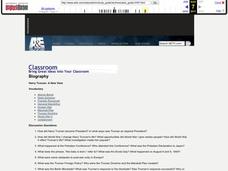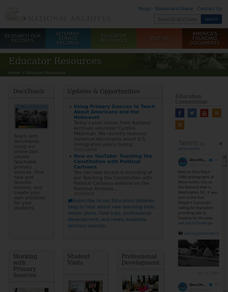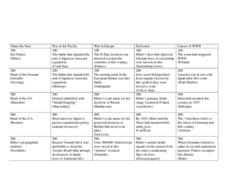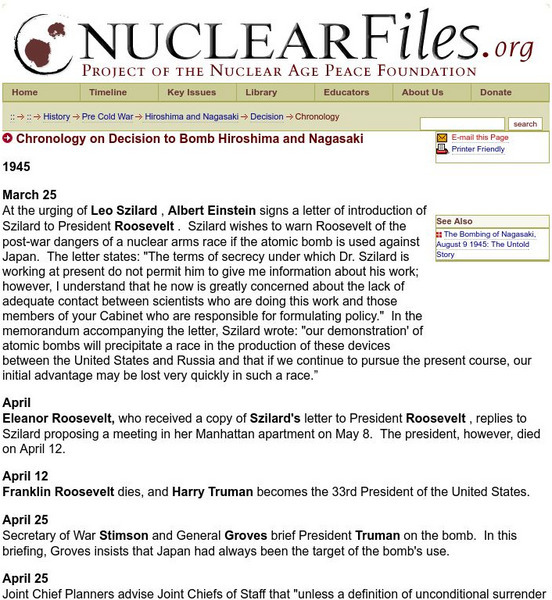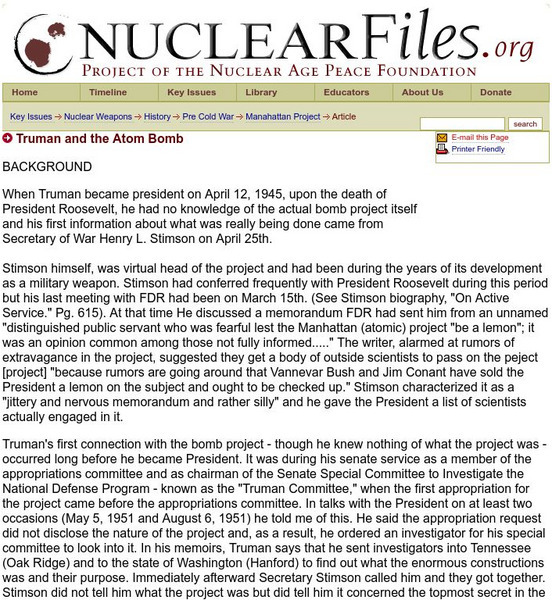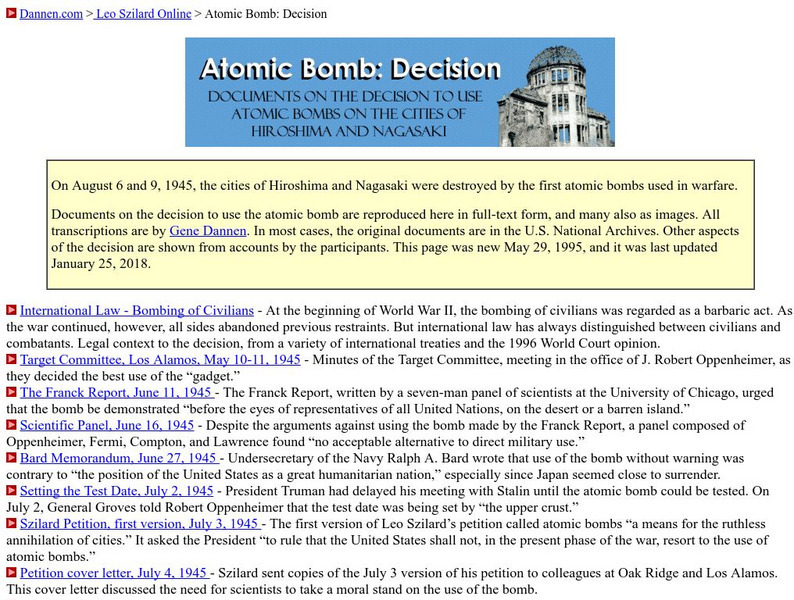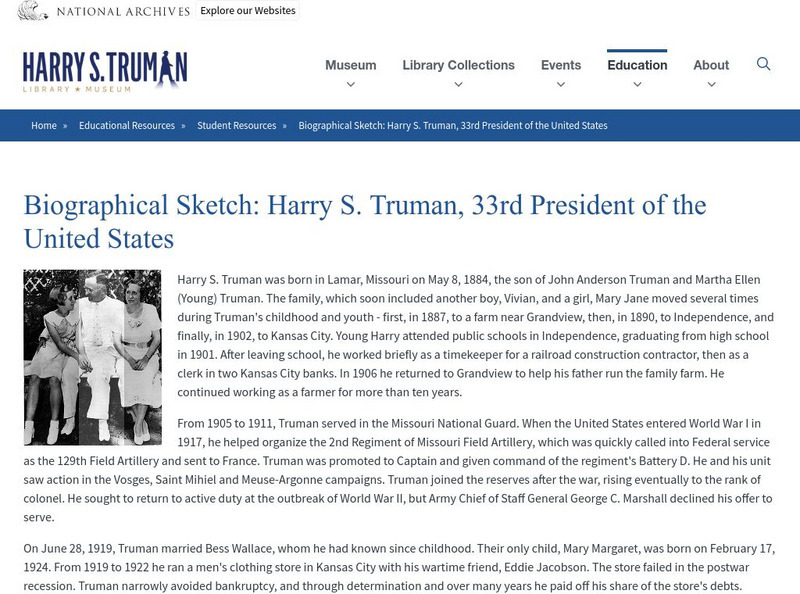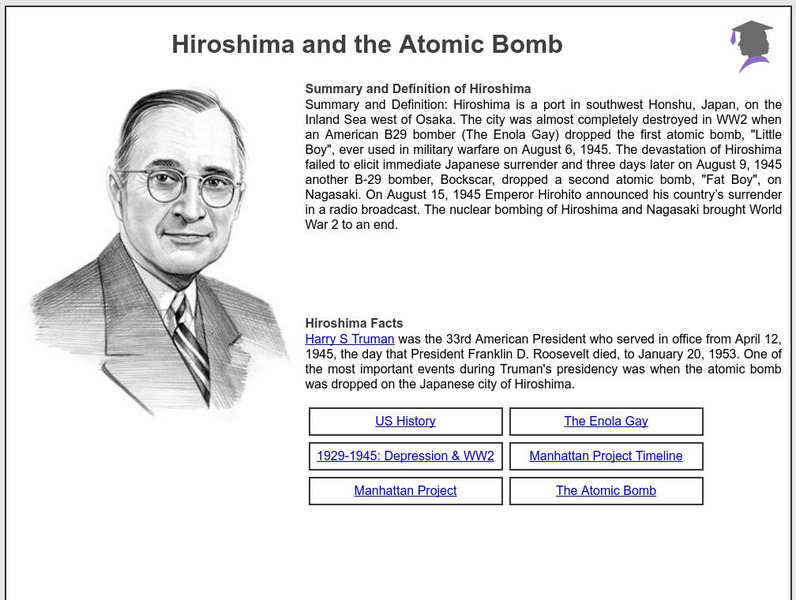Smithsonian Institution
Cold War
The Cold War was not necessarily always cold in temperature, but the relationship between the United States and the Soviet Union sure was frigid! Scholars read various passages, view exhibition graphics, and observe an artifact from the...
Curated OER
World War II
High schoolers examine the events of World War II that led to the dropping of the atomic bomb on Japan. Creating a decision making tree, they weigh the positives and negatives of the decision to use the bomb. They participate in a...
Curated OER
Harry Truman: A New View
Students explore how Harry Truman became President and in what ways was Truman an atypical President. They examined World War I changed Truman's life and what opportunities World War I gave certain people and how World War II affected...
Curated OER
United States - Japanese Relations In Post World War II Era
Ninth graders explore the relationship between the United States and Japan. In groups, classmates research the treatment of Koreans and Americans as prisoners of war. Pupils examine the effect of politics and agreements during the war....
Curated OER
The Cold War Era (1945 - 1991)
Provide learners with an excellent resource focused on the Cold War Era. Starting in 1945 and going all the way to 1991, the Cold War Era included major historical events, such as the Berlin Wall, Warsaw Pact, the Korean War, and the...
Curated OER
Sentence Completion: Low-Advanced SAT Level
Imagine a sentence completion activity that includes a detailed explanation for how to determine the correct response! Here it is. The resource can be used for independent practice, as a warm-up, for group discussion, or as part of a...
Curated OER
It's Up for Debate
Students work together to research issues surrounding World War II. They review the decisions that were made at the time. They participate in a debate and how those decisions maintained world peace.
Curated OER
U.S. History
In this U.S. history worksheet, 5th graders complete multiple choice questions about important events in U.S. history. Students complete 5 multiple choice questions.
Foreign Policy Research Institute
Categories of Cold War Histiography
While the objective is to provide an overview of the Cold War in preparation for further study, this resource addresses the topic at a rather advanced level, and might need its own introductory lesson. The handouts include terms such as...
Curated OER
AMERICAN INVOLVEMENT IN WORLD WAR II: THE PACIFIC THEATER 1941-1945
Tenth graders describe roles of key figures in the Pacific Theater of war during World War II. In this American History lesson, 10th graders research key events of the Pacific Theater of War during World War II. Students...
Curated OER
Memorandum of a Conference with President Eisenhower after Sputnik
Learners use the National Archives to research how the United States and the Soviet Union south to maintain its supremacy after World War II.
Curated OER
Jeopardy Review for WWII
Learners participate in a Jeopardy-style review game for a quiz on WWII. They divide into teams, choose team captains and answer a variety of questions pertaining to the study of WWII.
Constitutional Rights Foundation
Constitutional Rights Foundation: Rules of War: Choices: Truman, Hirohito, and the Atomic Bomb
Lesson and activity on rules of war and the decision to drop the atomic bomb during WWII.
Other
Nuclearfiles.org: Chronology on Decision to Bomb
This detailed chronology of the events and communication of 1945-1946 shows Truman's role in the process of the decision to drop the world's first atomic bomb used in warfare upon Hiroshima and then the second upon Nagasaki. Also...
Khan Academy
Khan Academy: The Manhattan Project and the Atomic Bomb
Discusses the Manhattan Project of the United States which worked on developing nuclear weapons during World War II. It led to the two atomic bombs that were dropped on Japan in August 1945, ending the war with Japan.
Other
Nuclearfiles.org: Truman and the Atom Bomb
Read background information about Harry Truman and the development of the atomic bomb prior to his presidency. Includes excerpts from official documents and conversations during the Truman Administration.
National Cable Satellite Corporation
C Span Classroom: World War Ii the Decision to Use the Atomic Bomb
This video provides Lt. Col. Grant Weller, who describes the decision of the United States to use the atomic bomb on Japan to end World War II. Student questions are provided to assess their understanding of the information.
Other
Atomic Bomb: Decision
An indexing page which links to several pages of letters, diary excerpts, public reports, and personal correspondence relating to the use of the first atomic bomb. Includes letters and petitions drafted by scientists involved with the...
PBS
Pbs: American Experience: Truman: Foreign Affairs
This site gives a great overview of the early Cold War under President Truman. Describes relations with the Soviet Union, the atomic bomb, actions in western Europe, and the Korean War. A great piece that gives the reader a fantastic...
Harry S. Truman Library and Museum
Tpml: Truman and the Bomb, a Documentary History
This site offers a comprehensive list of primary source documents from Harry S. Truman regarding the Potsdam Conference and decision to use atomic weapons.
Digital History
Digital History: The Decision to Drop the Bomb [Pdf]
The day before the bombing of Pearl Harbor, President Franklin Roosevelt gave the go-ahead to scientists to develop an atomic bomb. This site gives a good overview of the war in the Pacific against Japan, the increasing successes of the...
Harry S. Truman Library and Museum
Harry S. Truman Library & Museum: Truman Biography
A very easy-to-read biographical sketch of Harry S. Truman. Includes suggestions for further reading.
Siteseen
Siteseen: American Historama: The Atomic Bomb
Provides interesting information, history, and facts on the Atomic Bomb and its use during WWII.
Siteseen
Siteseen: American Historama: Hiroshima and the Atomic Bomb
Discussion of the effects of the atomic bomb on Hiroshima and the end of World War II.




